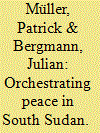|
|
|
Sort Order |
|
|
|
Items / Page
|
|
|
|
|
|
|
| Srl | Item |
| 1 |
ID:
159774


|
|
|
|
|
| Summary/Abstract |
In this introductory article of the special issue, we examine European Union (EU) mediation practice and identify different conceptual and empirical perspectives from which it can be analyzed. We present different understandings of mediation in research and practice a definition and conceptual clarification of EU mediation practice, and offer a definition that covers mediation efforts and mediation support activities. Then, the institutional architecture for EU mediation activities is presented. Next, the focus of this special issue is examined and research questions that have not yet been sufficiently addressed in existing research of EU foreign policy and mediation are discussed. Based on these questions, we offer several fruitful avenues for studying EU mediation: examining the drivers of EU mediation, EU mediation roles and strategies, and EU mediation effectiveness. Finally, we provide an overview of the contributions to this special issue is presented.
|
|
|
|
|
|
|
|
|
|
|
|
|
|
|
|
| 2 |
ID:
171713


|
|
|
|
|
| Summary/Abstract |
Previous research has primarily focused on the EU’s high-profile involvement as direct mediator in peace negotiations. Conversely, less attention has been devoted to the EU’s support to third parties’ mediation efforts, which is a significant component of its mediation activities. Addressing this research gap, this article develops a conceptual framework for the systematic analysis of EU mediation support, identifying key mediation support techniques and the conditions for their success. In terms of mediation support techniques, the EU may rely on “endorsement”, “coordination”, “assistance”, and “lending leverage” to empower and steer third party mediators in line with its mediation objectives and values. We illustrate the utility of the conceptual framework for the EU’s support to IGAD in mediating in South Sudan’s civil war. We find that the EU has contributed significantly to IGAD’s empowerment in terms of endorsement, coordination, assistance, and lending leverage. Simultaneously, our analysis also points to important challenges in the EU-IGAD relationship, which relate to challenges concerning strategic engagement with IGAD’s internal politics that are marked by diverging interests and ties of its member states to the conflict parties.
|
|
|
|
|
|
|
|
|
|
|
|
|
|
|
|
| 3 |
ID:
159778


|
|
|
|
|
| Summary/Abstract |
This article compares UN and EU mediation practice in the Kosovo-Serbia conflict. It proposes a conceptual framework to analyze mediation effectiveness and its conditions and applies it to the UN-led Kosovo Status Talks in Vienna (2006–2007) and the ongoing EU-facilitated dialogue between Belgrade and Pristina (since 2011). The EU’s relatively high degree of effectiveness compared to the UN effort can be partly explained by the application of a strategy of manipulation, drawing on the EU’s strong leverage vis-à-vis both sides; partly by pointing to the conflict context which has been more favorable to mediation since 2011. At the same time, the analysis reveals that EU mediation has not led to any changes concerning Serbia’s stance toward the recognition of Kosovo’s independence. The continuing non-resolution of the conflict demonstrates the limits of the EU’s manipulative mediation approach and points to a substantial dilemma of EU mediation.
|
|
|
|
|
|
|
|
|
|
|
|
|
|
|
|
| 4 |
ID:
160811


|
|
|
|
|
| Summary/Abstract |
This article explains the creation of the European Institute of Peace (EIP) in May 2014. Combining constructivist insights on policy ideas with a framing approach, it proposes a conceptual framework to analyse the dynamics of interaction between state and non-state actors (NSAs) with regard to formulating new policies and creating new institutions. Focusing on the role of frame entrepreneurs, framing strategies and frame resonance, it argues that the creation of the EIP was a result of framing undertaken by an advocacy coalition in which Sweden and Finland, together with specialized NGOs and individual Members of the European Parliament (MEPs), played the role of frame entrepreneurs. This advocacy coalition managed to convince a number of European states there was a certain gap in the EU’s mediation capacities and that a new institution independent of the EU was needed to address it. The limited degree of frame resonance among the majority of EU member states and their reluctance to join the institute explain why the EIP initiative struggled to receive broad political support.
|
|
|
|
|
|
|
|
|
|
|
|
|
|
|
|
|
|
|
|
|